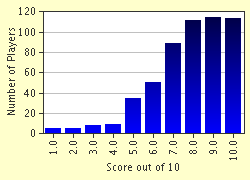Quiz Answer Key and Fun Facts
1. Should you desire to express your great pleasure and joy with this quiz, you might wish to call on a noun that begins with "de". If one adds a space after "de" and reads "de" as "the", you have de thing that drives away de dark. What is the un-spaced "de" word?
2. Should you find this quiz especially abhorrent, a six-letter word beginning with "de" would be a good choice to express your dislike. If you place a space after "de" and read "de" as "the", you have de loathsome thing that students must take for a grade. What is the un-spaced "de" word?
3. My friend Ann has decided to totally commit to the FunTrivia website. There is a verb beginning with "de" that would describe this action (present tense). If you add a space after "de" and read the "de" as "the", you have what they count on Election Day. What is the un-spaced word?
4. Having exposed my quiz as an utter fraud, you wish to let everyone know. There is a verb beginning with "de" that may suffice for describing the action of condemning my quiz in no uncertain terms. Should you add a space after the after "de" and read the "de" as "the", you would have de sound de baby makes when it is unhappy.
5. As my boss, you have decided that I have reached my level of incompetence, and it would be best if you returned me to my former, lower position in the hierarchy. The action you are planning to take could be described by a verb beginning with "de". Now, if you look carefully at the light streaming through the window you might see a minuscule particle of dust. If you take the aforementioned "de" word, place a space after "de" and read "de" as "the", you would have de word for de dust particle. What is the verb meaning to reduce my job level?
6. Running a trivia site is an expensive proposition. Advertising and membership fees are use to offset the expenses. There is a word starting in "de" that could be substituted for "offset" in the previous sentence. If you add a space after "de" and read the "de" as "the", you have de thing I would enter if I wanted to join in a fight. What is the un-spaced word?
7. As your plane nears the airport, the pilot informs the passengers that he is in the process of losing altitude for the final time prior to landing, using a word beginning in "de" to describe the airplane's final drop. The person in the seat next to you removed his shoes earlier in the flight and there is a distinctly unpleasant aroma wafting in your direction. If you add a space after "de" in the word the pilot used for loss of altitude and read the "de" as "the", you have another expression for de aroma from your fellow passenger's feet. What is the un-spaced word?
8. Your train has pulled into the station. There is a word beginning in "de" that is typically used to designate train stations. If you add a space after "de" and read the "de" as "the", you would have something to cook in. What is the un-spaced word?
9. You want to lessen your taxable income by reducing it by the amount of your charitable contributions. There is a verb beginning in "de" that describes what you wish to do with your charitable contributions. If you add a space after "de" and read the "de" as "the", you have de tube that carries the heat in your home heating system.
10. You've discovered that my quiz is a pretentious sham. You could use a verb beginning with "de" to describe the act of exposing my shallow deception. Then, if you added a space after "de" and read the "de" as "the", you would have de place in which to sleep. What is the un-spaced word?
Source: Author
uglybird
This quiz was reviewed by FunTrivia editor
fringe before going online.
Any errors found in FunTrivia content are routinely corrected through our feedback system.

